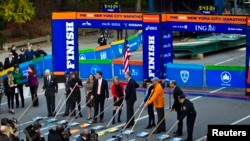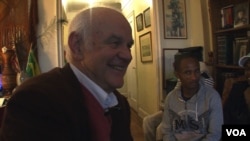NEW YORK CITY —
This year’s New York City Marathon will have reminders of Superstorm Sandy, which forced its cancellation last year, and of the bombings at the Boston Marathon in April. Runners affected by both calamities will be among the 48,000 racing along the winding, 42-kilometer route that touches every New York City borough. Security will be beefed up as well, with thousands of police stationed along the route, backpacks and some other items prohibited, and restricted entry for blocks around the finish line.
Among the runners will be 19,000 international competitors from all over the world, including a few who will stay with Bill Staab, president of the West Side Runners Club in Manhattan. At 74, Staab no longer enters marathons himself – although he says he ran 28 in his time. These days, retired from his import-export business, he dedicates much of his time to working with foreign-born members of the club and with runners visiting from abroad.
The face of running in New York is changing, Staab said, as immigrant and working-class runners take up the sport. Some years ago, his club began to attract South and Central American immigrants, many of whom work low-wage jobs and train and compete in their few spare hours.
“There is a mixture of motivations, for those runners from Latin America,” Staab said. “They often started running through soccer, and when they wanted to develop their stamina, they started running longer distances and found that they were really very, very good. And some of them dropped soccer all together, and began to run in races. Sometimes it’s just for the honor of doing well, sometimes it’s when the race does have some prize money.”
Later, he said, “More Africans began to come here, of even a higher quality, and these runners consider themselves to be professional, and they basically train and run races in order to earn an income when possible. So, New York is a mosaic in the races of a huge mixture of abilities, economic levels, colors; it’s absolutely fabulous,” Staab said.
Staab has hosted international marathon runners for many years at his two-bedroom apartment in Manhattan. This year, for the New York City Marathon, eight or nine Ethiopians will be staying for several days. Everyone helps cook Ethiopian food or pasta, and he said it never seems too crowded.
“You know, these are very quiet people, and they’re small, and good sleepers,” he said. “If you train very hard, you get exhausted, and you just knock out and sleep.”
Staab said there is a good chance this year of a New Yorker crossing the finish line first. If it happens, it would be the first time a local has won in 39 years. Staab’s hopes for a local winner are pinned on Buzunesh Deba, a member of West Side Runners, who was born in Ethiopia and has lived in New York for five years. Deba ran the 2011 New York race in two hours, 23 minutes and 15 seconds -- losing the women’s event by just four seconds.
“Her chances are probably as good as any other elite runner's, maybe better,” Staab said. “But there is very strong competition, both from other international runners who have been invited in specifically for the race, and Americans who are living in the U.S. coming in from California and other such places… So we just wish her all the luck in the world, and hopefully she can win, and if she doesn’t, hopefully she can have a very good time.”
The runner who beat Deba in 2011, her friend and fellow Ethiopian, Firehitwot Dado, is competing again in this year’s race, as are the two top favorites, Kenyans Edna Kiplagat and Priscah Jeptoo. Geoffrey Mutai of Kenya, who won in 2011, and Ethiopian Tsegaye Kebede are favored in the men’s event.
Among the runners will be 19,000 international competitors from all over the world, including a few who will stay with Bill Staab, president of the West Side Runners Club in Manhattan. At 74, Staab no longer enters marathons himself – although he says he ran 28 in his time. These days, retired from his import-export business, he dedicates much of his time to working with foreign-born members of the club and with runners visiting from abroad.
The face of running in New York is changing, Staab said, as immigrant and working-class runners take up the sport. Some years ago, his club began to attract South and Central American immigrants, many of whom work low-wage jobs and train and compete in their few spare hours.
“There is a mixture of motivations, for those runners from Latin America,” Staab said. “They often started running through soccer, and when they wanted to develop their stamina, they started running longer distances and found that they were really very, very good. And some of them dropped soccer all together, and began to run in races. Sometimes it’s just for the honor of doing well, sometimes it’s when the race does have some prize money.”
Later, he said, “More Africans began to come here, of even a higher quality, and these runners consider themselves to be professional, and they basically train and run races in order to earn an income when possible. So, New York is a mosaic in the races of a huge mixture of abilities, economic levels, colors; it’s absolutely fabulous,” Staab said.
Staab has hosted international marathon runners for many years at his two-bedroom apartment in Manhattan. This year, for the New York City Marathon, eight or nine Ethiopians will be staying for several days. Everyone helps cook Ethiopian food or pasta, and he said it never seems too crowded.
“You know, these are very quiet people, and they’re small, and good sleepers,” he said. “If you train very hard, you get exhausted, and you just knock out and sleep.”
Staab said there is a good chance this year of a New Yorker crossing the finish line first. If it happens, it would be the first time a local has won in 39 years. Staab’s hopes for a local winner are pinned on Buzunesh Deba, a member of West Side Runners, who was born in Ethiopia and has lived in New York for five years. Deba ran the 2011 New York race in two hours, 23 minutes and 15 seconds -- losing the women’s event by just four seconds.
“Her chances are probably as good as any other elite runner's, maybe better,” Staab said. “But there is very strong competition, both from other international runners who have been invited in specifically for the race, and Americans who are living in the U.S. coming in from California and other such places… So we just wish her all the luck in the world, and hopefully she can win, and if she doesn’t, hopefully she can have a very good time.”
The runner who beat Deba in 2011, her friend and fellow Ethiopian, Firehitwot Dado, is competing again in this year’s race, as are the two top favorites, Kenyans Edna Kiplagat and Priscah Jeptoo. Geoffrey Mutai of Kenya, who won in 2011, and Ethiopian Tsegaye Kebede are favored in the men’s event.







